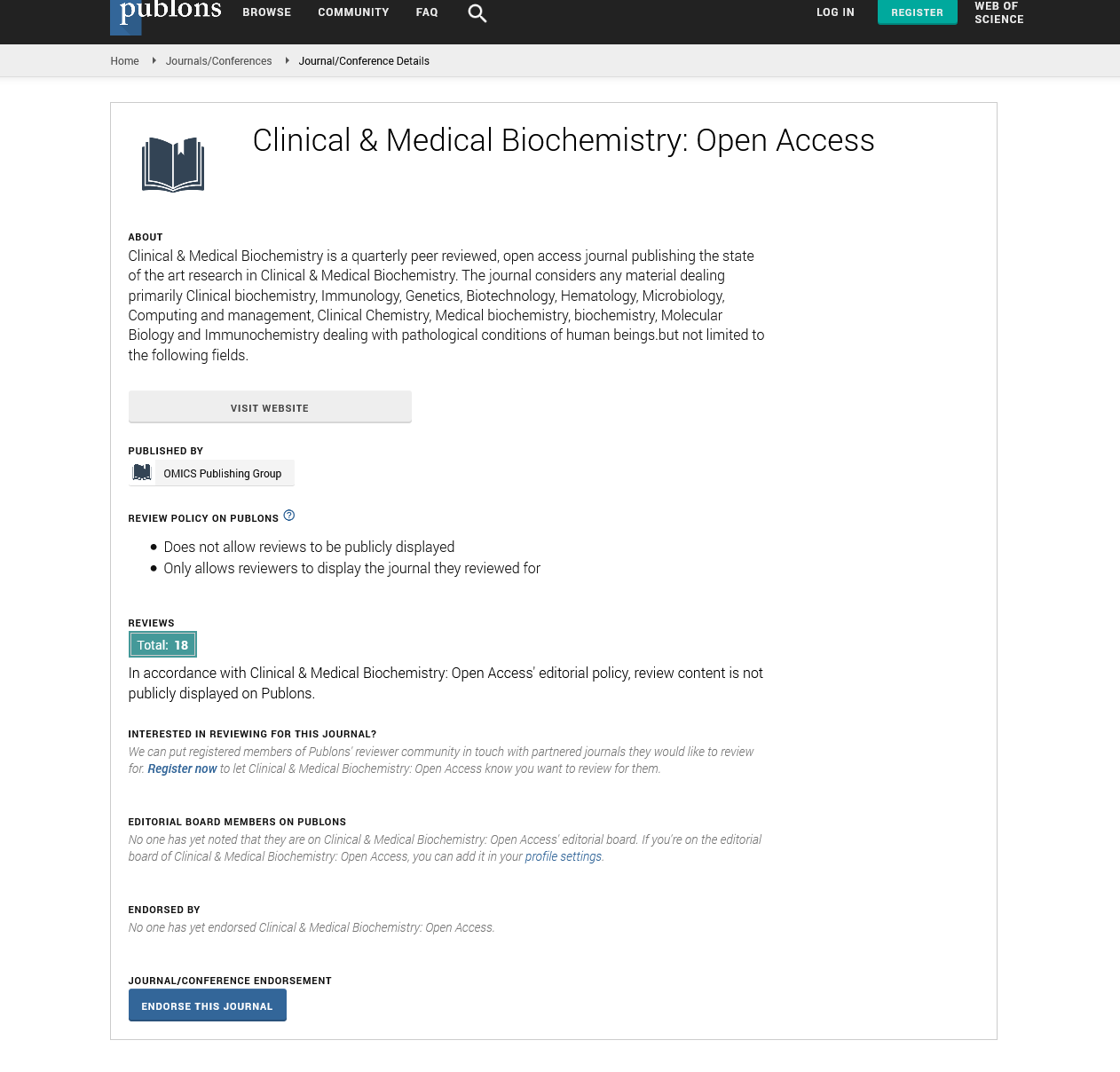Indexed In
- RefSeek
- Directory of Research Journal Indexing (DRJI)
- Hamdard University
- EBSCO A-Z
- OCLC- WorldCat
- Scholarsteer
- Publons
- Euro Pub
- Google Scholar
Useful Links
Share This Page
Journal Flyer

Open Access Journals
- Agri and Aquaculture
- Biochemistry
- Bioinformatics & Systems Biology
- Business & Management
- Chemistry
- Clinical Sciences
- Engineering
- Food & Nutrition
- General Science
- Genetics & Molecular Biology
- Immunology & Microbiology
- Medical Sciences
- Neuroscience & Psychology
- Nursing & Health Care
- Pharmaceutical Sciences
Perspective - (2023) Volume 9, Issue 5
Small Vessel Brain Lesions in APS: Exploring Diagnosis and Management
Jonathan Dicks*Received: 01-Sep-2023, Manuscript No. CMBO-23-23072 ; Editor assigned: 04-Sep-2023, Pre QC No. CMBO-23-23072 (PQ); Reviewed: 18-Sep-2023, QC No. CMBO-23-23072 ; Revised: 25-Sep-2023, Manuscript No. CMBO-23-23072 (R); Published: 02-Oct-2023, DOI: 10.35841/2471-2663.23.9.182
Description
Antiphospholipid Syndrome (APS) is a complex autoimmune disorder characterized by the presence of Antiphospholipid Antibodies (aPL) and a wide range of clinical manifestations, including thrombotic events and pregnancy complications. While the clinical criteria for APS diagnosis have been wellestablished, there is growing recognition of the importance of extra-criteria aPL in patients with various clinical presentations. Small vessel brain lesions represent one such illustration that has gained recognition in recent years. It is an autoimmune disorder characterized by the presence of aPL, which are a group of autoantibodies directed against phospholipid-binding proteins. The two most commonly tested aPL are Anticardiolipin Antibodies (aCL) and Lupus Anticoagulant (LA), although several other aPL have been identified. The diagnosis of APS traditionally relies on clinical criteria, which include a history of at least one clinical event and the presence of aPL. Clinical events associated with APS include venous or arterial thrombosis and pregnancy complications such as recurrent miscarriages. The presence of aPL is determined through laboratory tests, and these antibodies are known to promote a prothrombotic state, contributing to the clinical manifestations of APS. While the clinical criteria for APS diagnosis have proven valuable, there is a growing recognition that aPL may be associated with a broader spectrum of clinical manifestations than initially described.
These additional manifestations, often referred to as "extracriteria" APS, include neurological symptoms, heart valve disease, skin lesions, and small vessel involvement, among others. Small vessel brain lesions, in particular, have become an area of significant interest. Small vessel brain lesions, also known as cerebral Small Vessel Disease (SVD), encompass a group of neurological disorders characterized by damage to the small blood vessels in the brain. This can lead to various clinical manifestations, including lacunar infarcts, white matter hyperintensities, microbleeds, and cognitive impairment. SVD is a common cause of vascular dementia and contributes to stroke risk. Several studies have focused the association between APS and small vessel brain lesions. These lesions are often detected through neuroimaging techniques such as Magnetic Resonance Imaging (MRI) and are frequently observed in APS patients with neurological symptoms. The underlying pathophysiological mechanisms linking aPL to small vessel brain lesions are complex and multifactorial. One advanced mechanism involves the prothrombotic properties of aPL, which can lead to microvascular thrombosis in the brain's small vessels. This microvascular thrombosis can result in ischemic damage and contribute to the development of small vessel brain lesions. A growing body of evidence suggests that aPL can induce endothelial dysfunction, leading to increased vascular permeability and inflammation in small cerebral vessels. These pathological changes may contribute to the formation of small vessel brain lesions.
A disruption of the Blood-Brain Barrier (BBB) is another potential mechanism by which aPL may influence small vessel brain lesions. The impaired BBB function can allow harmful substances to enter the brain parenchyma, promoting neuronal damage. A comprehensive clinical assessment is essential to determine the severity of neurological symptoms and their impact on the patient's daily life. This may involve neuropsychological testing to assess cognitive function and psychiatric evaluations to address mood and behavioral changes. The management of APS patients with small vessel brain lesions requires a multidisciplinary approach involving rheumatologists, neurologists, and other specialists. The primary goals of treatment are to prevent further thrombotic events, manage neurological symptoms, and improve the patient's overall quality of life. Anticoagulation therapy is a basic element of APS management and aims to prevent thrombotic events. Warfarin and Direct Oral Anticoagulants (DOACs) are commonly prescribed, but treatment decisions should be individualized based on the patient's clinical presentation and risk factors.
In cases of severe APS with refractory neurological symptoms, immunosuppressive therapy may be considered to reduce aPL production and inhibit the autoimmune response. Immunosuppressive agents like corticosteroids, azathioprine, and rituximab have been used in selected cases. Neurological symptoms associated with small vessel brain lesions may require symptomatic management. This can include medications for headache relief, antiepileptic drugs for seizure control, and cognitive rehabilitation programs for patients with cognitive impairment. Patients with APS should be counseled on lifestyle modifications to reduce their overall thrombotic risk. This includes smoking cessation, weight management, and regular physical activity. Regular follow-up appointments are essential to monitor the patient's response to treatment, assess any potential side effects of anticoagulation therapy, and adjust treatment strategies as needed.
Conclusion
Antiphospholipid syndrome is a multifaceted autoimmune disorder associated with a wide range of clinical manifestations. Small vessel brain lesions represent an important subset of neurological complications in APS patients. The pathophysiological mechanisms linking aPL to small vessel brain lesions are complex and involve thrombosis, endothelial dysfunction, and blood-brain barrier disruption. Diagnosis and evaluation of small vessel brain lesions in APS patients rely on advanced neuroimaging techniques, laboratory tests, and comprehensive clinical assessments. The management of these patients requires a multidisciplinary approach, including anticoagulation therapy, immunosuppression in select cases, and symptomatic management of neurological symptoms. Early diagnosis and appropriate management remain key to optimizing outcomes and preventing recurrent thrombotic events in this patient population.
Citation: Dicks J (2023) Small Vessel Brain Lesions in Antiphospholipid Syndrome (APS): Exploring Diagnosis and Management. Clin Med Bio Chem. 9:182.
Copyright: © 2023 Dicks J. This is an open-access article distributed under the terms of the Creative Commons Attribution License, which permits unrestricted use, distribution, and reproduction in any medium, provided the original author and source are credited.

